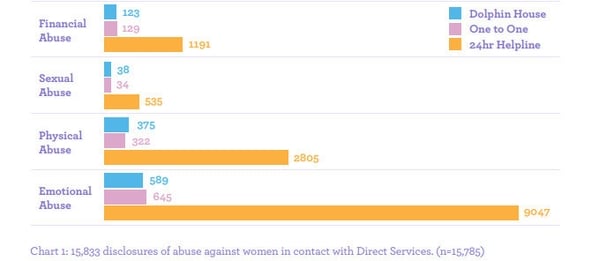Merriam-Webster announced on Monday that their 2022 word of the year is "gaslighting". The US dictionary publisher says that the term - which they describe as "the act or practice of grossly misleading someone, especially for one's own advantage" - saw a 1,740% increase in lookups, with high interest throughout the year.
With the popularity of the word soaring in 2022, we're sharing our interview with Margaret Martin, Director of Women's Aid Ireland, to explore the term more thoroughly.
What is gaslighting?
'Gaslighting' is a term that describes the action of psychologically manipulating a person, or a group of people, into doubting themselves; their memory, their perception, or even their sanity.
The term comes from the movie Gaslight (1944) - adapted from Patrick Hamilton's 1938 play - starring Ingrid Bergman and Charles Boyer.
The Oscar-winning film follows Paula (Bergman) and Gregory (Boyer), a couple who fall in love and move into Paula's deceased aunt's house in London. Before long, viewers are left to call Gregory's motives into question as he repeatedly tricks Paula into believing she's forgetful, confused, and possibly unwell.
At one point, operating on a floor that Paula believes to be boarded up, Gregory causes the gas lights in the house to dim and flicker, but when Paula questions this, Gregory insists that she is imagining things.

What are the signs of gaslighting?
Women's Aid Ireland told RTÉ LifeStyle that the term 'gaslighting' is relatively new but is often used by women who ring the service to describe emotional abuse which can show itself in a number of ways.
"Women would use that term themselves to talk about how they're made to feel that they are imagining things or how they're being undermined. Very often we hear about how she [the caller] tends to leave her keys in a particular place for the car or the house and he [her partner] moves them.
"It can be small things but it is somebody who knows you - it's about trying to unhinge you," Margaret Martin explained.

Is gaslighting illegal?
In 2019, a bill outlawing psychological abuse in relationships was passed in the Dáil.
The act of "coercive control" being recognised as a serious offence follows an annual report from Women's Aid Ireland which revealed 10,281 disclosures of emotional abuse and 1,443 of financial abuse alongside 3,502 disclosures of physical abuse and 607 of sexual abuse in 2017.
Martin says she hopes this move will lead to more training for Gardaí, court personnel, and judges so that they are better able to identify the signs of emotional abuse in domestic violence situations.
"There is a need to up the capacity of people who are going to respond to somebody who is experiencing coercive control. The danger with something like coercive control is that people look at it and think it's all very vague.
"There are women who have been killed and there was never any physical violence there was just emotional abuse - the only reason I say 'just' is because people tend to dismiss it - and people end up being killed, maybe when they try to separate.
"It's really important that state agencies take these things seriously and realise that you don't always need a bruise to be abused."

What can you do if you witness or experience gaslighting?
According to Martin, talking about the situation and reaching out to Women's Aid is the best thing to do if you are the subject or the witness of emotional abuse.
Abusers can often use repetitive tactics that can leave heir targets feeling isolated and confused, speaking about this manipulation can help to make the situation clearer and make the person feel less alone.
"If you've been punched, if you have a broken bone, if you have a bruise, if you have a cut - you can see it so you know it's not your imagination and you don't need to make sense of it [in the same way]. You'd have other levels of distress," she explained.
"In terms of emotional abuse, what we're talking about is more vague; it's about feeling nervous about their partner or their reaction so being able to talk that out [is helpful].
"What happens in that conversation is that women start to see much more of what's actually happening to them and the patterns of his behaviours."

Does gaslighting only happen in romantic relationships?
Gaslighting is not limited to romantic relationships. It can happen within any situation whether it be with family, friends, colleagues or even en masse in a political context.
If you, or anyone you know, is experiencing domestic abuse you can call Women Aid's 24hr National Freephone Helpline on 1800 341900.


